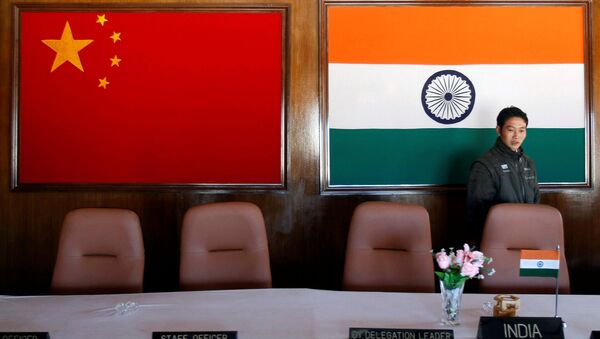During Chinese Defense Minister Wei Fenghe’s official visit to India this week, both countries agreed to "expand engagement between their armed forces" and "work towards a new bilateral memorandum of understanding (MOU) on Defense Exchanges and Cooperation" to replace the MOU signed in 2006, the Indian Defense Ministry said in a statement on Thursday.
According to the statement, both countries agreed to fully implement ongoing confidence building measures, based on consensus reached during the meeting between Indian Prime Minister Narendra Modi and Chinese President Xi Jinping in late April, by establishing an operational "hotline" between relevant departments of their armed forces.
READ MORE: India, China to Expand Military Cooperation Year After Border Standoff
The latest military engagement between India and China came after a bitter military standoff at a disputed border area, which lasted for almost three months last summer. After Modi agreed to attend the BRICS Summit held in China last September and met with Xi, both sides agreed to work toward a peaceful resolution to the border dispute.
Not Giving Up
However, military engagement between India and China is unlikely to take bilateral military ties to the next level, as both countries have not changed their positions on the territorial dispute, political analysts argued.
"I don’t think bilateral military ties between India and China can improve significantly, because, fundamentally, there’s the issue of unresolved territorial dispute. They have not resolved this and we don’t see any roadmap for resolving the territorial dispute. The main job of the military [of both countries] is to protect the sovereignty and territorial integrity," Srikanth Kondapalli, a professor under the Center for East Asian Studies at Jawaharlal Nehru University in New Delhi, India, told Sputnik.
The expert stressed that both sides are still only seeking to reduce tensions over the border dispute.
"There are still tensions militarily, as both countries try to stabilize bilateral relations. The keyword both sides are using is to how to ‘manage’ the border. To that extent, there’s the realization that ‘we need to stabilize, but we can’t sacrifice our sovereignty claims,’" he said.
READ MORE: Indian Military Joins Chinese Army's Foundation Day Celebration
While leaders of both India and China understand that resorting to military options to solve the dispute would lead to mutual destruction, neither side remains unwilling to relinquish its sovereignty claims, which could lead to similar military standoffs in the future, professor Kondapalli suggested.
"The ground reality for India and China is that these are two big countries and two nuclear neighbors. This means explicit conflict can be rule out, because physical confrontation would be total destruction on both sides. No leader in India or China would accept the war as a solution. Having said that, neither of them is willing to give up on sovereignty. They would hold on for a while, and then they could get tired of discussing those issues and we could have another similar incident as what happened last year," he said.
No Benefit
In face of growing hostility from the United States, including threats of a trade war and maritime tensions in the South China Sea, it’s natural for China to seek to reduce tensions with India, to avoid being caught with confrontations on both sides, the Chinese political analysts pointed out.
"The bigger picture is that China and the United States are entangled in a trade war and tensions continued to escalate in the South China Sea. As China faces more pressure from the southeast side, we probably want to resolve our problems with India on the southwest side, to avoid facing hostile forces on both sides," Ni Lexiong, a military expert at the University of Politics and Law in Shanghai, told Sputnik.
READ MORE: Beijing Bashes 'Absurd' Pentagon Report on Alleged Chinese Military Threat
Instead of taking advantage of China’s vulnerability to put more military pressure on the border, New Delhi’s decision to work with Beijing came as a result of careful calculation, Professor Kondapalli from Jawaharlal Nehru University explained.
"First, this [putting more military pressure on China] would not resolve the problem for India. Even if India steps up the pressure, there will probably not be any concrete or tangible benefit out of that. On the other hand, it would have alienated China further. India is a big country that has to take cautious moves after considering the cost and benefits. I think India’s position not to put pressure on China during this difficult time is also a calculation based on the ground reality," he said.
Perception of China's Rise
"The question is which Chinese ancestor are you referring to? Are you talking about the Chinese territory under China’s first Emperor Qin Shihuang, Hongwu Emperor during the Ming Dynasty, or Qianlong Emperor of the Qing Dynasty? We have over 2000 years of history with over hundreds of emperors. Which ancestor’s territory should we defend?" he said.
Despite the fact that China has repeatedly stressed that the country seeks to rise peacefully, whether the nation can rise through peaceful means depends on the reactions from other world powers and how they perceive the impact of China’s rise, Ni warned.
READ MORE: Nepal Needs Both India and China for Speedy Development — Senior Fellow
"When the United States was on the rise, the world’s center was still in Europe. This offered the United States to build up its strength without attracting attention from world powers at the time. From a geopolitical standpoint, China’s rise is more similar to what Germany faced when it was on the rise in Europe, which was closely watched by neighboring countries. The Indo-Pacific strategy from the United States is more of a reaction to China’s ambitious Belt and Road Initiative," he said.
The expert explained that, in the eyes of hostile foreign forces, China’s Belt and Road Initiative could be perceived as similar to the Great East Asia Co-Prosperity Sphere proposed by Japan before the Second World War.
However, the expert added that China could learn lessons from the devastating cost during the rise of other countries, such as the United Kingdom, France, Germany, Japan and the United States, and avoid making similar mistakes that could leave to possible military conflicts.
The views and opinions expressed in this article are those of the researchers and do not necessarily reflect those of Sputnik.




